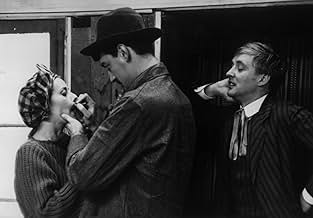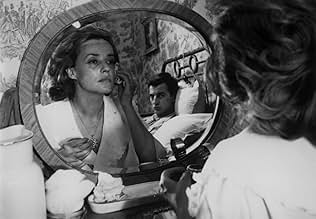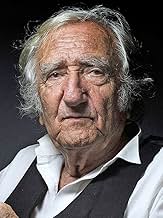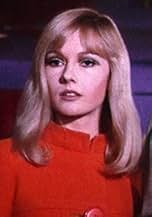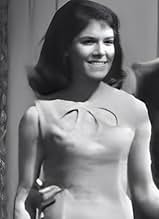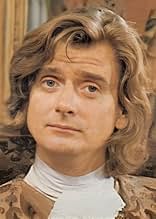ÉVALUATION IMDb
7,7/10
46 k
MA NOTE
Un triangle amoureux entre deux amis et une femme impulsive sur plusieurs décennies.Un triangle amoureux entre deux amis et une femme impulsive sur plusieurs décennies.Un triangle amoureux entre deux amis et une femme impulsive sur plusieurs décennies.
- Director
- Writers
- Stars
- Nominé pour le prix 2 BAFTA Awards
- 3 victoires et 4 nominations au total
Oskar Werner
- Jules
- (as Oscar Werner)
Serge Rezvani
- Albert
- (as Bassiak)
Michel Subor
- Récitant
- (voice)
- …
Danielle Bassiak
- Compagnon d'Albert
- (uncredited)
Elen Bober
- Mathilde
- (uncredited)
Pierre Fabre
- Ivrogne in Cafe'
- (uncredited)
Dominique Lacarrière
- Une des femmes
- (uncredited)
Bernard Largemains
- Merlin
- (uncredited)
Kate Noelle
- Birgitta
- (uncredited)
Jean-Louis Richard
- Cliente au Cafe'
- (uncredited)
Michel Varesano
- Cliente au Cafe'
- (uncredited)
Christiane Wagner
- Helga
- (uncredited)
Avis en vedette
Whenever a commentator declares outright that a film is a complete waste of time and that nobody, BUT NOBODY, should ever watch it, I tend to peg that commentator as an opinionated ass. So I would never say that about a well-respected film like "Jules and Jim." But quite honestly, I can't warm up to it. I've watched it on more than one occasion over the years, and it never fails to put me to sleep at both ends of my anatomy. I've just viewed a DVD edition in which a film scholar clearly explains his views on the fascination of "Jules and Jim." But I still couldn't see why the relationship of these three tedious characters, discussed and analyzed in all its very tedious minutiae by those same characters and an off-screen narrator (also tedious), should interest me. It's certainly beloved by academic types (maybe for those very same characteristics?), and film critics eat it up like it has gravy on it. Like another commentator, I'm a bit puzzled by all the comments about its lyrical, lighthearted and idyllic qualities. I'm left with the impression of a rather dry, academic dissertation on the complexities of male-female relationships ca. 1961 (the 1910 setting seems to me immaterial to the script).
I can't help feeling that I'm missing something, and I'm not averse to French films, but they're usually older, pre-new-wave films, for example "Forbidden Games," "French Can-Can," or Pagnol's "Fanny" trilogy. I take it that the sentimentality of such films is one of the things new wave directors reacted against. If so, I can't jump on their bandwagon, try as I might. I've enjoyed some of Truffaut's work, but not this, I'm afraid.
To those who love and appreciate "Jules and Jim" -- have pleasure of it. I envy you for that, and maybe I'll try it again in a few years.
I can't help feeling that I'm missing something, and I'm not averse to French films, but they're usually older, pre-new-wave films, for example "Forbidden Games," "French Can-Can," or Pagnol's "Fanny" trilogy. I take it that the sentimentality of such films is one of the things new wave directors reacted against. If so, I can't jump on their bandwagon, try as I might. I've enjoyed some of Truffaut's work, but not this, I'm afraid.
To those who love and appreciate "Jules and Jim" -- have pleasure of it. I envy you for that, and maybe I'll try it again in a few years.
Jules et Jim is a difficult film, there's no question about that. I'd say the only thing that kept me watching was my love of Truffaut his ingenuity in cinematography, dialogue and just the whole tone of the film. That he could keep such melodramatic (if not drab) stuff somewhat entertaining is a testament to his mastery of the medium. I loved the blending of historical film into the narrative; I don't know if he was the first person to do this I highly doubt it but he certainly did it well in this picture.
Jules et Jim is a study of capriciousness. Catherine a woman to whom monogamy seems like a foreign concept is, to paraphrase the film, `not particularly intelligent, beautiful or kind, but she's treated like a queen.' Why Jules and Jim love her so, I don't know. They seem like strong enough characters to be without such a difficult woman, but I guess that question is at the center of the film.
For some reason, Jules et Jim reminded me of L'Avventura by Antonioni maybe because it was also a hard movie to enter and because the characters were so inaccessible. There are certainly elements of the neo-realism in this film, (one need look no further than the extensive use of mist and the forest scenes that closely resemble the dream sequences of Fellini, De Sica, et. al.)
Overall, I would say this picture is worthwhile, although there are certainly better, more accessible and mature Truffaut films out there.
Jules et Jim is a study of capriciousness. Catherine a woman to whom monogamy seems like a foreign concept is, to paraphrase the film, `not particularly intelligent, beautiful or kind, but she's treated like a queen.' Why Jules and Jim love her so, I don't know. They seem like strong enough characters to be without such a difficult woman, but I guess that question is at the center of the film.
For some reason, Jules et Jim reminded me of L'Avventura by Antonioni maybe because it was also a hard movie to enter and because the characters were so inaccessible. There are certainly elements of the neo-realism in this film, (one need look no further than the extensive use of mist and the forest scenes that closely resemble the dream sequences of Fellini, De Sica, et. al.)
Overall, I would say this picture is worthwhile, although there are certainly better, more accessible and mature Truffaut films out there.
Time and revisionist critics have tried to tarnish the gleam of Truffaut's final masterpiece - citing its apparent misogyny and apoliticism; but for some of us, 'Jules et Jim' is the unforgettable film that opened the gates to both European film, and the great masters of American cinema like Hitchcock, Hawks and Ray.
'Jules et Jim' is, along with 'Citizen Kane', THE vindication of the pleasures of cinematic form: the first half especially, in its rush of narrative registers and technical exuberance, is unparalleled in modern film. This isn't mere trickery - the use of paintings, books, plays, dreams, conversations, documentary footage, etc., as well as the different ways of telling a story through film, all point to the movie's theme - how do you represent people and the world in art without destroying them? Or is art the only to save people and life from extinction?
The foregrounding of theatricality, acting, disguises, pseudonyms, games, works-within-the-work, all point to the high modernism in which the film is set, when the old certainties about identity and place were being destroyed by the Great War. In fact the film could be considered Cubist in the way it uses film form to splice up and rearrange images, space, characters, viewpoints.
Truffaut's film is a beautiful elegy about time: the historical time heading towards destruction in the shape of the Nazis, and the circular time of love, obsession and art. These times struggle in the film's structure, history zipping past years in the framing, Parisian sections, and days stretching out interminably in the central rural rondelay.
Far from being misogynistic, the film places Catherine's speech about 'grains of sand' at its philosophical heart. AND she's played by Jeanne Moreau, the most honest and human of all great actresses.
'Jules et Jim' is, along with 'Citizen Kane', THE vindication of the pleasures of cinematic form: the first half especially, in its rush of narrative registers and technical exuberance, is unparalleled in modern film. This isn't mere trickery - the use of paintings, books, plays, dreams, conversations, documentary footage, etc., as well as the different ways of telling a story through film, all point to the movie's theme - how do you represent people and the world in art without destroying them? Or is art the only to save people and life from extinction?
The foregrounding of theatricality, acting, disguises, pseudonyms, games, works-within-the-work, all point to the high modernism in which the film is set, when the old certainties about identity and place were being destroyed by the Great War. In fact the film could be considered Cubist in the way it uses film form to splice up and rearrange images, space, characters, viewpoints.
Truffaut's film is a beautiful elegy about time: the historical time heading towards destruction in the shape of the Nazis, and the circular time of love, obsession and art. These times struggle in the film's structure, history zipping past years in the framing, Parisian sections, and days stretching out interminably in the central rural rondelay.
Far from being misogynistic, the film places Catherine's speech about 'grains of sand' at its philosophical heart. AND she's played by Jeanne Moreau, the most honest and human of all great actresses.
There is a book by Goethe mentioned in this movie, it's "Wahlverwandschaften", and its appearance is quite meaningful. Because the movie takes a look on human loves and lives that is quite similar to older Goethe's fatalistic world-view in his novel, very far from hope and idealisms. Strength (Moreau's character) and Weakness (Jim) are equal forces of nature, and both conduct us to death. The stoic attitude (Jules) is resignation and, seen this way, it is "weakness" too, but, on the other hand, it seems to be the STRONGEST way, because it means survival. JULES ET JIM, both in its content and in its aesthetics, has an air of antique tragedies, but - and this is more like the German novel - without complain, without crying. That's why it leaves you so "unsatisfied", and that's why it's still disturbing, even today.
Jules (Oskar Werner), an introspective Austrian and Jim (Henri Serre) a confident Frenchman begin a friendship that defies understanding. What begins as an exchange and discourse over art develops into a bond that seems able to withstand anything, including fighting against each other in WWI. After the war has ended, the duo goes on sharing art and women with each other, until Jules falls in love with Catherine (Jeanne Moreau), a free-spirited woman with an unpredictable temperament, prone to emotional outbursts. Despite the easy-going inexperienced Jules being an odd fit for Catherine, he asks Jim not to chase Catherine, so he can have her love all to himself. Despite Jules' request, he invites Jim on many of the couple's outings and the trio spends most of their time together. Even after Catherine and Jules marry and have a child, Jim is invited to live in their home with them. Over time, an intimacy begins to develop between Jim and Catherine, which Jules is aware of. Instead of risking losing his friend or his marriage Jules allows the intimacy to blossom which creates a domino effect of emotions between the three of them. Life no longer is about what each wants individually, but rather what each other wants and expects and what kind of life they want the other to fulfill. The decision to allow the three-way relationship has enduring effects on all involved due to the complicated nature of the two men's love for Catherine, as well as their devotion to each other. Bonds will be tested, as Jules and Jim face another war, this time, off the battlefield.
"You said, "I love you," I said, "Wait." I was going to say, "Take me," you said, "Go away." Arguably the most memorable quote from Jules and Jim also acted as a heart-wrenching opening, conveying to the audience just how much of an emotional experience they were in for. As we are introduced to each character, Truffaut takes his deliberate time revealing what Jules and Jim mean to each other. It is Truffaut's prowess as a director that allows the audience to truly understand the depth of devotion that Jules and Jim share for each other. Without his labored efforts, the rest of the story would pass by unnoticed because this truly is a story about three people in love rather than a love triangle with each point seeking out the object of their affection. The story relies on the understanding that neither Jules, Jim, nor Catherine will seek to fulfill their own needs at the expense of each other. Technically, Truffaut showed mastery on only his third feature film. His use of freeze frames was fantastic and essential in allowing the audience to realize the profound effect on the emotional state of the men involved with Catherine, each "moved by a symbol they could not understand." Truffaut also uses the overlay technique a few times to great success, placing Catherine's face over a few scenes really driving home the idea that every thought or activity Jules and Jim ever took part in was driven by Catherine. In just three short years since his first feature, The 400 Blows--a masterpiece in its own right, Truffaut further revealed his mastery for capturing the complexity of human emotion like few others before him.
Few films tackle the emotionally intense themes Jules and Jim take on. Truffaut delves into pain, the kind of pain that is caused by yearning in love. Love and lust is a theme constantly at the forefront of the film, as well, along with a precise distinction between the two. Jules, lacking the romantic experience of Jim, attempts to shield Catherine from Jim for fear that he will only lust after her. When it becomes clear that Jim actually loves Catherine, as Jules does, he relents and decides to share his love of Catherine with Jim. Jules loves Catherine and shares a devotion to Jim, so he supports a union between Jim and Catherine because he needs to be a part of each's life and wants happiness for all parties involved, and vice-versa for Catherine and Jim. Devotion, like I have never since seen replicated on screen, is the driving force behind each character's actions and thoughts. The way Truffaut managed to capture that devoted motivation shows impeccable insight to the human spirit and cements him as the purest most personal filmmaker I have ever seen. Running the gamut of emotional commentary, Truffaut also successfully illustrates loneliness, especially experienced by Catherine, and its power over life. Catherine is clearly a damaged soul, she has met and overcome many obstacles in her life, most of which, are only alluded to. There are aspects of both Jules and Jim that she depends on for her very survival, necessitating that they both remain in her life. Catherine has been unable to commit to another due to her expectation of being abandoned, as only hinted to in a couple of scenes between her and Jules. It is this damage that makes her reckless and prompts Jules and Jim to be more cautious in their interactions with her. To be able to show every unlikeable aspect of a human being, yet, still endear that person in the hearts of the audience was a skill no one in the history of cinema has been more proficient at than Francois Truffaut. By the film's conclusion, we may not have that ending that leaves each better off and happy, but what we do get is the realization that we're all in search of our statue; that one person that is perfect to us and for us despite their obvious flaws, just as Jules and Jim traversed gardens in search of their statues before they happened upon the same one, and once we find that statue, we will do whatever it takes to keep it in our view.
"You said, "I love you," I said, "Wait." I was going to say, "Take me," you said, "Go away." Arguably the most memorable quote from Jules and Jim also acted as a heart-wrenching opening, conveying to the audience just how much of an emotional experience they were in for. As we are introduced to each character, Truffaut takes his deliberate time revealing what Jules and Jim mean to each other. It is Truffaut's prowess as a director that allows the audience to truly understand the depth of devotion that Jules and Jim share for each other. Without his labored efforts, the rest of the story would pass by unnoticed because this truly is a story about three people in love rather than a love triangle with each point seeking out the object of their affection. The story relies on the understanding that neither Jules, Jim, nor Catherine will seek to fulfill their own needs at the expense of each other. Technically, Truffaut showed mastery on only his third feature film. His use of freeze frames was fantastic and essential in allowing the audience to realize the profound effect on the emotional state of the men involved with Catherine, each "moved by a symbol they could not understand." Truffaut also uses the overlay technique a few times to great success, placing Catherine's face over a few scenes really driving home the idea that every thought or activity Jules and Jim ever took part in was driven by Catherine. In just three short years since his first feature, The 400 Blows--a masterpiece in its own right, Truffaut further revealed his mastery for capturing the complexity of human emotion like few others before him.
Few films tackle the emotionally intense themes Jules and Jim take on. Truffaut delves into pain, the kind of pain that is caused by yearning in love. Love and lust is a theme constantly at the forefront of the film, as well, along with a precise distinction between the two. Jules, lacking the romantic experience of Jim, attempts to shield Catherine from Jim for fear that he will only lust after her. When it becomes clear that Jim actually loves Catherine, as Jules does, he relents and decides to share his love of Catherine with Jim. Jules loves Catherine and shares a devotion to Jim, so he supports a union between Jim and Catherine because he needs to be a part of each's life and wants happiness for all parties involved, and vice-versa for Catherine and Jim. Devotion, like I have never since seen replicated on screen, is the driving force behind each character's actions and thoughts. The way Truffaut managed to capture that devoted motivation shows impeccable insight to the human spirit and cements him as the purest most personal filmmaker I have ever seen. Running the gamut of emotional commentary, Truffaut also successfully illustrates loneliness, especially experienced by Catherine, and its power over life. Catherine is clearly a damaged soul, she has met and overcome many obstacles in her life, most of which, are only alluded to. There are aspects of both Jules and Jim that she depends on for her very survival, necessitating that they both remain in her life. Catherine has been unable to commit to another due to her expectation of being abandoned, as only hinted to in a couple of scenes between her and Jules. It is this damage that makes her reckless and prompts Jules and Jim to be more cautious in their interactions with her. To be able to show every unlikeable aspect of a human being, yet, still endear that person in the hearts of the audience was a skill no one in the history of cinema has been more proficient at than Francois Truffaut. By the film's conclusion, we may not have that ending that leaves each better off and happy, but what we do get is the realization that we're all in search of our statue; that one person that is perfect to us and for us despite their obvious flaws, just as Jules and Jim traversed gardens in search of their statues before they happened upon the same one, and once we find that statue, we will do whatever it takes to keep it in our view.
Le saviez-vous
- AnecdotesHenri-Pierre Roché's original novel was based on his own experiences as a young man. The original Catherine was still alive when the film was released and even attended the premiere incognito.
- GaffesWhen Catherine lights the letters on fire, they are at first away from her dress, but in the next shot they are burning on top of her dress.
- Autres versionsThe Criterion Region 1 disc and the Tartan Region 2 DVD have a scene in which the film is reversed left/right. When Jules, Jim, and Albert are sitting on the grass sharing stories about the war, the order of the three characters repeatedly changes between shots. This does not occur in other DVD releases of this film, including the Fox/Lorber Region 1 release.
- ConnexionsEdited into Laggiù qualcuno mi ama (2023)
Meilleurs choix
Connectez-vous pour évaluer et surveiller les recommandations personnalisées
- How long is Jules and Jim?Propulsé par Alexa
Détails
- Date de sortie
- Pays d’origine
- Langues
- Aussi connu sous le nom de
- Jules and Jim
- Lieux de tournage
- sociétés de production
- Consultez plus de crédits d'entreprise sur IMDbPro
Box-office
- Brut – États-Unis et Canada
- 509 $ US
- Fin de semaine d'ouverture – États-Unis et Canada
- 11 206 $ US
- 25 avr. 1999
- Brut – à l'échelle mondiale
- 496 383 $ US
- Durée1 heure 45 minutes
- Couleur
- Mixage
- Rapport de forme
- 2.35 : 1
Contribuer à cette page
Suggérer une modification ou ajouter du contenu manquant

Lacune principale
By what name was Jules et Jim (1962) officially released in India in English?
Répondre
![Regarder Bande-annonce [OV]](https://m.media-amazon.com/images/M/MV5BMWM5OGI0MjUtZDRhMC00ZGQ1LTk0NWEtMWMzZDFhMjA1OTk1XkEyXkFqcGdeQXRodW1ibmFpbC1pbml0aWFsaXplcg@@._V1_QL75_UX500_CR0)
